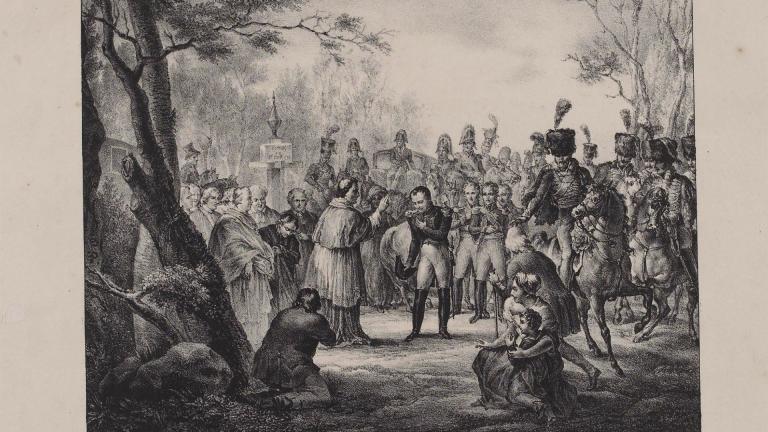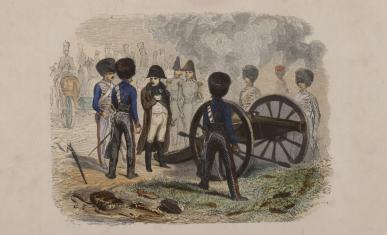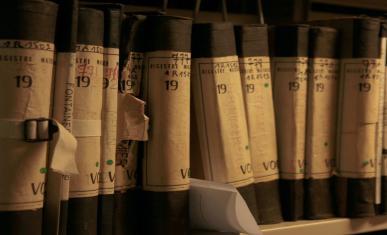June 1812: beginning of Pope Pius VII’s captivity at the Château de Fontainebleau
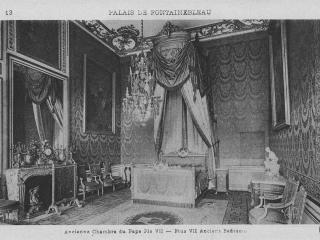
Cut from his entourage and his cardinals who were imprisoned in Vincennes or exiled in the provinces, Pope Pius VII arrived in Fontainebleau in June 1812, where he had already been invited in 1804, at the end of a long and trying journey. In order to keep up appearances, he was treated as a host rather than a captive.
He returned to the superb 11-room apartment that had once been Anne of Austria's, and had since been re-furnished and redecorated for Hortense and Louis Bonaparte, mixing premier furniture by Jacob-Desmalter and Marcion with prestigious Gobelins tapestries inherited from the Ancien Régime. The Emperor had a House set up for him, the costs of which were paid for by the service of the Grand Marshal of the Emperor's palace.
However, the pope refused to play the game they wanted him to play. He hardly took any advantage of the gardens and was actually often ill. His voluntary confinement in his apartments aroused the irony of Police Minister Savary, as he recounted in his Memoirs that the Pope "would mend the tears in his clothes himself; sometimes he would sew a button on his trousers; he would wash his simar, as he used to drop a lot of tobacco in it. One had to be full of illusions to believe a sovereign pontiff who was reduced to such a state of misery could be infallible".
Archives have shown the Pope did a lot of reading during his captivity, mainly to escape boredom. In the palace’s vast library, he borrowed the 24 volumes of the History of the Church by Abbot Bérault-Bercastel, as well as the Works of Saint Cyprian, and several books such as a Course on Canon Law, Fénelon’s treatise on the Authority of the Pope and the Acts of the Council of Trent.
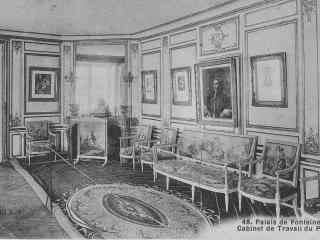
At the beginning of 1813, returning from the disastrous Russian campaign, Napoleon made one last attempt to negotiate with the Pope. The court made an unexpected trip to Fontainebleau from 19th to 27th January. General Durand, Marie-Louise's chambermaid, talked about the improvised stay, which took place in the freezing cold: "The mess incurred by this unexpected trip was a very pleasant thing. No one had a maid, there were no chambermaids, no night caps, nothing for grooming; added to that, it was extremely cold; the water was freezing next to the fire".
After several days of negotiations, worn down, under pressure and even under threat from the emperor, unsettled by the advice of three "red" cardinals, meaning they were supporters of Napoleon, Lattier de Bayane, Ruffo and Doria Pamphili, the pontiff gave in and agreed to sign a new Concordat on 25th January. Napoleon immediately had this new agreement announced in the press. After having been authorised to see a few of his close entourage, "black" cardinals Di Pietro, Litta, Gabrielli, Consalvi and Pacca, he ended up withdrawing the agreement, to Napoleon’s great fury.
However, Napoleon was then busy preparing for his new campaign in Saxony and had little time left for religious affairs. Defeated in Leipzig in October 1813, preparing to face the Allies on French territory, in January 1814 he decided to set the Pope free, fearing that his opponents would come to Fontainebleau to free him. In addition, the Kingdom of Italy, which had been invaded by Austria, was on the verge of collapse, as his brother-in-law Murat, King of Naples, had just declared war on France. In this context, the pontiff's return to his States was a chance to disrupt the political game in the peninsula, hinder Murat's latest ambitions and potentially delay the Neapolitan troops advancing towards northern Italy and the French border.
The Sovereign Pontiff left Fontainebleau on Sunday 23rd January 1814 under good escort, and after a short stay in Savona from 16th to 19th March, was handed over to the Austrian authorities on 25th March. From then on, the Pope never ceased to claim his temporalities, taking diplomatic steps with allied sovereigns, before triumphantly returning to Rome on 24th May 1814.
During his exile on Saint Helena, Napoleon spoke very little about the Pope's captivity in Fontainebleau, as he was aware it was one of his greatest failures, even though he denied having "imprisoned" the Pope, stating he had been accommodated in a palace with all the honours due to his rank. But the head of the Vatican had chosen to lock himself up in his room like a captive in a cell, rather than as a distinguished guest...
